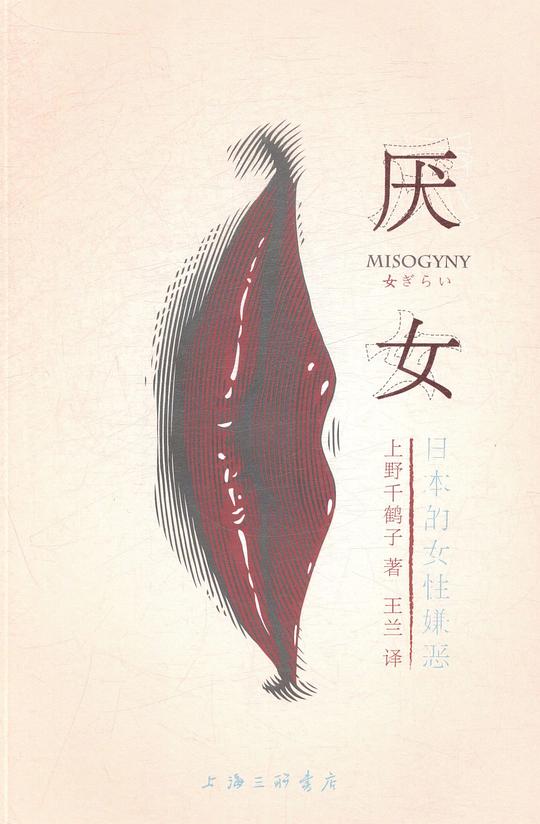
习惯而非宿命:揭秘“厌女”现象
书名:厌女
1
0

勇士之心 2023-05-23 14:11:41
Orientalism, as said by Edward Said, "no matter how many books about Easterners one reads, one understands only what is in the Westerners mind" is a reflection of Western self-centeredness. Similarly, male self-centeredness stems from the sexual objectification of women within male groups through a simple and fixed format, usually achieved through gender identification by contrasting the male individual with the opposite gender. Thus, to achieve a dominant sexual position and regard women with contempt has led to male misogyny. This also encompasses the exclusion of those deemed different, such as hatred towards homosexuals, to avoid the possibility of being reduced to sexual objects. The resulting blurred male-female boundary has given rise to anxiety and fear, forming the basis of discrimination towards women and homosexuals. Discrimination is "the act of other-ing and assimilating someone else into anothers affirmative action," in the words of Hiroshi Sato.
The deep-seated fear among males towards the emergence of homosexuality within male groups stems from the fact that they, too, bear hidden desires towards males. This means that there is a possibility of a reversal of roles from a dominant sexual position to a subordinated one. Children being subjected to sexual abuse or being attracted to younger individuals of the same gender helps avoid such possibilities, as power disparity ensures that the fixed asymmetrical relationship cannot be reversed.
Therefore, we understand that the heterosexual order places the male same-sex social desire and misogyny at its core, accompanied by homophobia. This structure deepens the social bonds of males and intensifies patriarchal tendencies. Inevitably, within this socially unequal structure, women tend to gravitate towards high-power resource groups and, in seeking to allocate resources for power, often adopt a sexual object role. This inadvertently gives men even more power, exacerbating the unfairness of the patriarchal system. The most blatant aspect of female misogyny is the cutting of ties with fellow women. Women inherently view themselves as exceptions or different from other women, and it seems like they would be accepted by male groups. However, such compliance fosters gender discrimination and does not gain male approval. Such behavior is common among socially disadvantaged individuals, such as Blacks in the middle-class white society. The mechanism of competition involving women around men results in the absence of male same-sex social bonds. All of this demonstrates female misogyny, resulting from the unfairness of social structures. However, the self-liberation ideals of feminism are about being aware of this and fighting it. Homosexuality may not be entirely about hating heterosexual power disparities, as some are inspired merely to seek different relationships from fathers, sons, and brothers, and remain unrelated to misogyny.
Of course, we have been deeply influenced by such an environment and cannot even imagine a gender-equal society. Misogyny has penetrated the very core of our desires, and removing it could mean negating desire entirely. However, these are societys imposed concepts. Foucault proposed that “the sensationalization of rights” is achieved through managing sexuality by linking happiness and rights, which are incompatible concepts. It manifests in two ways: "the sexualization of rights" refers to the domination of sex in the expression of rights, with mens "protection" of women being just a packaged form of control; "the powerization of pornography" is the expression of sex through violence and control, even leading to killing women because they failed to comply. Consequently, we have been educated, learned, molded, controlled, and have had this concept implanted in our minds, making us believe that it is natural and instinctive. Mens sexual desire is seen as an animal instinct, but in reality, they can experience desire through the mere symbol of a woman, just like Pavlovs dog, meaning that sexual desire is conditioned by culture. Thus, this culture is like a model forcibly imposed upon us physically and mentally. Removing this model could make our body and mind collapse, but it is merely a habit and not fate.
Misogyny, like social gender, is a cultural product, and merely realizing that it is a cultural construction does not mean we can be liberated from it. It requires us to engage in long-term struggles, fighting against self-hatred while uniting with other women.
相关推荐
萤火谷的梦想家
艾莉森•麦吉出生于1960年,是美国《纽约时报》畅销书作家,同时也是大都会州立大学创意写作课的教授。她的作品被翻译成20多种语言并出版,也曾被提名普利策奖,并获得苏斯博士奖金奖、克里斯托弗图书奖、美国 [美]艾莉森•麦吉/[美]克里斯托弗•丹尼斯/绘 2023-03-27 16:50:25鬼马女神捕1·绝密卧底(上)
腹黑凤凰vs毒舌鸡妖——蓝翎:“小姬,跟我去人界吧!”姬十四:“干吗?让人宰了我做小鸡炖蘑菇吗?”蓝翎:“不啊,让妖怪宰了你做小鸡炖蘑菇更气派。”凤凰蓝翎和鸡妖姬十四生活在无忧无虑的灵界。他们的故乡叫 郝天晓 2023-04-17 00:22:47© 2023-2025 百科书库. All Rights Reserved.












发表评价